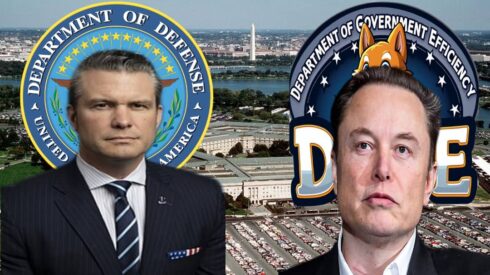Elon Musk, the billionaire entrepreneur behind SpaceX, Tesla, and Starlink, is set to receive a top-secret military briefing in the coming weeks. This move underscores the increasing dependence of the United States Department of Defense (DoD) on Musk’s cutting-edge technologies, particularly in space-based communications, defense systems, and AI-powered warfare strategies. The Pentagon has reportedly classified the meeting at the highest security level, highlighting its critical significance.
This development comes amid geopolitical tensions, emerging threats from China and Russia, and rapid advancements in military space technologies. Elon Musk’s Starlink satellite network has already played a pivotal role in Ukraine’s war efforts, and his collaboration with the U.S. Air Force on next-gen defense satellites has raised both interest and controversy. Analysts speculate that this meeting could shape future military space policies, AI integration, and cybersecurity measures.
What’s Behind the High-Level Security Clearance
Elon Musk’s access to top-secret military intelligence is not unprecedented but is now reaching new heights. His companies, particularly SpaceX, hold multiple high-value defense contracts, including launching classified spy satellites and supplying secure, resilient communications for U.S. military operations worldwide.
The briefing is expected to focus on national security threats, space warfare strategies, and advanced AI-driven defense systems. Officials are reportedly concerned about vulnerabilities in cybersecurity, satellite networks, and autonomous drone warfare. Elon Musk’s knowledge of artificial intelligence, quantum computing, and space-based reconnaissance systems makes him a key player in shaping the future of military operations.
Starlink and the Future of Military Communication
One of the main agenda items in Elon Musk’s briefing is likely to be the militarization of Starlink. The satellite constellation has already proven its capability in real-time battlefield intelligence, particularly in Ukraine, where it has helped maintain secure communications against Russian cyberattacks.
The U.S. military is considering expanding Starlink’s role into classified military operations, ensuring uninterrupted command and control in the event of cyber warfare or satellite jamming. However, concerns remain about Elon Musk’s independent decision-making power—as seen when he initially hesitated to provide Starlink access for Ukrainian offensive operations. This briefing could solidify Starlink’s role in future military strategies, ensuring it aligns with U.S. national security interests.
AI Warfare and SpaceX’s Role in Defense Tech
Artificial intelligence and automated warfare are expected to be major discussion points. The U.S. military is aggressively investing in AI-driven autonomous drones, missile systems, and predictive threat analysis, areas where Musk’s AI expertise could prove invaluable.
SpaceX’s Starshield program, a classified initiative designed to enhance military space capabilities, is another focal point. The Pentagon is reportedly exploring the deployment of AI-powered reconnaissance satellites, allowing for real-time threat assessment and enemy activity prediction. If integrated successfully, these technologies could redefine military strategy, enhancing preemptive defense mechanisms and rapid-response capabilities.
Concerns Over Elon Musk’s Influence and Global Ties
Despite his contributions, Musk’s ties with global powers, including China, have raised concerns among U.S. defense officials. His ventures, particularly Tesla’s significant presence in China, have led to speculation about potential security risks. Some lawmakers have questioned whether Musk should wield such high-level national security access, given his vast international business interests.
Furthermore, Musk’s often unpredictable decision-making, particularly regarding his companies’ roles in global conflicts, has led to concerns about over-reliance on a single individual for critical defense infrastructure. The Pentagon may use this briefing as an opportunity to establish clearer boundaries, regulations, and oversight mechanisms for Musk’s involvement in classified military operations.
The Broader Impact on U.S. National Security Strategy
Musk’s upcoming top-secret briefing could have profound implications for U.S. military strategy in space, AI warfare, and cyber defense. If SpaceX and Starlink become integral to military operations, it could lead to a major shift in defense policy, accelerating the transition toward private-sector-led defense innovation.
This meeting also signals the growing recognition that future warfare will be fought in space, cyberspace, and through AI-driven systems. With China and Russia advancing their military technologies, the U.S. is looking to leverage cutting-edge private-sector innovations to maintain its strategic advantage. Whether this briefing leads to a deeper partnership or increased scrutiny of Musk’s influence remains to be seen, but one thing is clear: Elon Musk is now a central figure in the future of U.S. military strategy.














